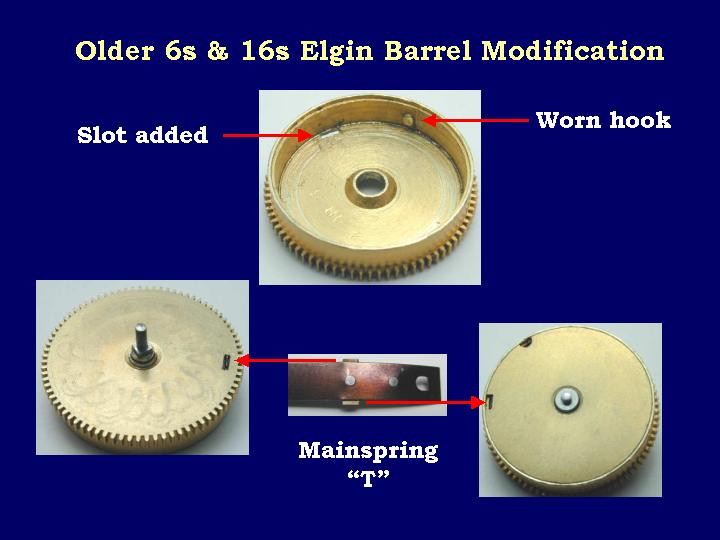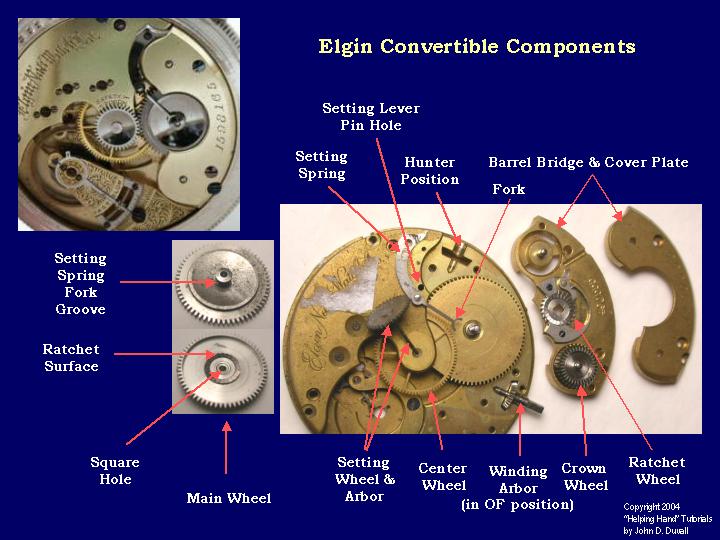
| WWT Shows | CLICK TO: Join and Support Internet Horology Club 185™ | IHC185™ Forums |

|
• Check Out Our... • • TWO Book Offer! • |
Welcome Aboard IHC185™  Internet Horology Club 185
Internet Horology Club 185  IHC185™ Discussion Site Main Page
IHC185™ Discussion Site Main Page  Horological Discussions, Questions and Answers
Horological Discussions, Questions and Answers  Pocket Watch Discussions
Pocket Watch Discussions  Unusual Elgin
Unusual Elgin
 Internet Horology Club 185
Internet Horology Club 185  IHC185™ Discussion Site Main Page
IHC185™ Discussion Site Main Page  Horological Discussions, Questions and Answers
Horological Discussions, Questions and Answers  Pocket Watch Discussions
Pocket Watch Discussions  Unusual Elgin
Unusual ElginGo  | New Topic  | Find-Or-Search  | Notify  | Tools  | Reply to Post  |  |
The watch noted below on ebay is strange (to me). Can anyone explain the type of mainspring (I guess) set-up on the watch? Is it typical of certain grades? Jessica | |||
|
| IHC Life Member |
Jessica, This appears to be a fine example of a 16s, Model 1, Grade 49. This watch uses a typical 16s mainspring. However, some of the older models require you to file off one of the "T" ends to fit the mainspring barrel. The most important feature of this watch is that it can be used in an open face case or hunter case by relocating the winding pinion. The Model 2 is another 16s model that has the three finger train bridge design. The 18s, model 6 had this design but I have yet to see one. The attached slide depicts the mainspring barrel used on a Model 2 watch and the modification. The hook was worn on this barrel and I decided to cut a slot in the barrel to better capture the mainspring. Elgin eventually incorporated this additional slot.  | |||
|
Hi John. I see that it's on models 1 and 2 of 16s as well as 18s model 6. When you say that the position of the winding pinion changes, I wasn't quite sure what you meant. The winding pinion would be at right angles to the winding arbor and the "crown wheel" (o main wheel), which meshes with the rachet wheel. So if, as in the photo, the position of the winding wheel pinion shifts, how is that accomplished? I hate to be so slow in understanding this, but I haven't been able to work much with watches as I'd like to. Thanks, so much, Jessica | ||||
|
| IHC Life Member |
Jessica, It’s difficult, if not impossible, to explain the operation of the Elgin convertible movement unless you see it in action. If you’re familiar with the operation of a conventional movement, this slide should help answer some of your questions. Note: Compare the assembled movement with the exploded view. As you can see, the pillar plate has two areas for the winding arbor to fit; the Hunter position and the OF (open face) position. By swapping position of the Crown Wheel and Winding Arbor, it can be “converted” to a Hunter movement. In the “wind” position (setting lever stowed), the Setting Spring pushes the Main Wheel down and away from the Setting Wheel and causes the Main Wheel to engage the Crown Wheel. Turning the Winding Arbor will now turn the Crown Wheel. The Crown Wheel interfaces with and turns the Main Wheel. The Main Wheel turns the mainspring arbor via a square hole. The ratcheted surface under the Main Wheel interfaces with the Ratchet Wheel. In the “set” position, the setting lever is pulled out which pushes a small pin through a hole in the pillar plate. This action lifts the Setting Spring, which raises the Main Wheel (via fork and groove) away from the Ratchet Wheel and allows it to interface with the Setting Wheel. When the Winding Arbor is turned, the Main Wheel will turn the Setting Wheel. The Setting Wheel has an arbor that extends through the hollowed Center Wheel arbor. The cannon pinion is attached to the end of this arbor. The setting wheel arbor has an interference fit with the Center Wheel arbor so the hands can be set. Under the dial, the cannon pinion, hour and minute wheels function the same as a conventional movement to drive the hour and minute hands. Whew! Hope this helps!  | |||
|
| Powered by Social Strata |
| Your request is being processed... |
|
©2002-2025 Internet Horology Club 185™ - Lindell V. Riddle President - All Rights Reserved Worldwide

